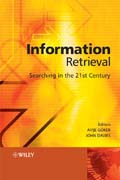
This book is an essential reference to cutting-edge issues and future directions in information retrieval. Information retrieval (IR) can be defined as theprocess of representing, managing, searching, retrieving, and presenting information. Good IR involves understanding information needs and interests, developing an effective search technique, system, presentation, distribution and delivery. The increased use of the Web and wider availability of information in this environment led to the development of Web search engines. This change hasbrought fresh challenges to a wider variety of users' needs, tasks, and typesof information. Today, search engines are seen in enterprises, on laptops, inindividual websites, in library catalogues, and elsewhere. "Information Retrieval: Searching in the 21st Century" focuses on core concepts, and current trends in the field. This book focuses on: Information Retrieval Models; User-centred Evaluation of Information Retrieval Systems; Multimedia Resource Discovery; Image Users' Needs and Searching Behaviour; Web Information Retrieval; Mobile Search; Context and Information Retrieval; Text Categorisation and Genre inInformation Retrieval; Semantic Search; The Role of Natural Language Processing in Information Retrieval: Search for Meaning and Structure; Cross-language Information Retrieval; and, Performance Issues in Parallel Computing for Information Retrieval. This book is an invaluable reference for graduate students on IR courses or courses in related disciplines (e.g. computer science, information science, human-computer interaction, and knowledge management), academic and industrial researchers, and industrial personnel tracking information search technology developments to understand the business implications. Intermediate-advanced level undergraduate students on IR or related courses will also find this text insightful. Chapters are supplemented with exercises to stimulatefurther thinking. INDICE: Foreword Preface List of Contributors Introduction 1 Information Retrieval Models Djoerd Hiemstra 1.1 Introduction 1.2 Exact Match Models 1.3 Vector Space Approaches 1.4 Probabilistic Approaches 1.5 Summary and Further Reading Exercises References 2 User-centred Evaluation of Information Retrieval Systems Pia Borlund 2.1 Introduction 2.2 The Medlars Test 2.3 The Okapi Project 2.4 The IIR Evaluation Model 2.5 Summary Exercises References 3 Multimedia Resource Discovery Stefan Ruger 3.1 Introduction 3.2 Basic Multimedia Search Technologies 3.3 Challenges of Automated Visual Indexing 3.4 Added Services 3.5 Browsing: Lateral and Geotemporal 3.6 Summary Exercises References 4 Image Users' Needs and Searching Behaviour Stina Westman 4.1 Introduction 4.2 Image Attributes and Users' Needs 4.3 Image Searching Behaviour 4.4 New Directions for Image Access 4.5 Summary Exercises References 5 Web Information Retrieval NickCraswell and David Hawking 5.1 Introduction 5.2 Distinctive Characteristics of the Web 5.3 Three Ranking Problems 5.4 Other Web IR Issues 5.5 Evaluation ofWeb Search Effectiveness 5.6 Summary Exercises References 6 Mobile Search David Mountain, Hans Myrhaug and Ay e Goker 6.1 Introduction: Mobile Search - WhyNow? 6.2 Information for Mobile Search 6.3 Designing for Mobile Search 6.4 Case Studies 6.5 Summary Exercises References 7 Context and Information Retrieval Ay e Goker, Hans Myrhaug and Ralf Bier 7.1 Introduction 7.2 What is Context?7.3 Context in Information Retrieval 7.4 Context Modelling and Representation7.5 Context and Content 7.6 Related Topics 7.7 Evaluating Context-aware IR Systems 7.8 Summary Exercises References 8 Text Categorisation and Genre in Information Retrieval Stuart Watt 8.1 Introduction: What is Text Categorisation? 8.2 How to Build a Text Categorisation System 8.3 Evaluating Text Categorisation Systems 8.4 Genre: Text Structure and Purpose 8.5 Related Techniques: Information Filtering 8.6 Applications of Text Categorisation 8.7 Summary and the Future of Text Categorisation Exercises References 9 Semantic Search John Davies, Alistair Duke and Atanas Kiryakov 9.1 Introduction 9 9.3 Meta-data and Annotations 9.4 Semantic Annotations: the Fibres of the Semantic Web 9.5 Semantic Annotation of Named Entities 9.6 Semantic Indexing and Retrieval 9.7 Semantic Search Tools 9.8 Summary Exercises References 10 The Role of Natural Language Processing in Information Retrieval: Searching for Meaning and Structure Tony Rose 10.1 Introduction 10.2 Natural Language Processing Techniques 10.3 Applications of Natural Language Processing in Information Retrieval 10.4 Discussion 10.5 Summary Exercises References 11 Cross-language Information Retrieval Daqing He and Jianqiang Wang 11.1 Introduction 11.2 Major Approaches and Challenges in CLIR 11.3 Identifying Translation Units 11.4 Obtaining Translation Knowledge 11.5 Using Translation Knowledge 11.6 Interactivity in CLIR 11.7 Evaluation of CLIR systems 11.8 Summary and Future Directions Exercises References 12 Performance Issues in Parallel Computing for Information Retrieval Andrew MacFarlane 12.1 Introduction 12.2 Why parallel IR? 12.3 Review of Previous Work 12.4 Distribution Methods for Inverted File Data 12.5 Tasks in Information Retrieval 12.6 A Synthetic Model of Performance for Parallel Information Retrieval 12.7 Empirical Examination of Synthetic Model 12.8 Summary and Further ResearchExercises References Solutions to Exercises Index
- ISBN: 978-0-470-02762-2
- Editorial: John Wiley & Sons
- Encuadernacion: Cartoné
- Páginas: 256
- Fecha Publicación: 01/05/2009
- Nº Volúmenes: 1
- Idioma: Inglés
